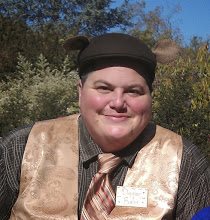 by Timnah Steinman This week I forgot it was International No-Diet Day. This week I spoke to a room of forty 6th graders. I told them about my experiences being born and raised round and fat and being told from my earliest memories that I did not fit, that I needed to be fixed, that I was not ok. I told them about how trying to diet with and for my parents and the doctors messed with my body and my spirit, because (as all the science seems to show) one consequence of dieting is triggering deep biological drives to gain and keep weight on. Diet culture (Mill Valley, 1970s and 80s) left me detached, uncertain of my right to live on this planet, unable to live in my body. I told them about being in my twenties and deciding that I wanted to live. Live now, because this whole "waiting to live" thing wasn't working out. And I renounced diets, and I got back in a swimming pool, made friends who were busy being fat and living right now. I told them about how a group of us made a fat synchronized swimming team, wore bikinis and flowered caps and performed our routines for all kinds of folks. I talked about how at every single performance at least one woman would come up to me, always smaller than me, and always while I was still dripping from the pool, grinning in my bikini and red nails, and tell me that they hadn't been in a bathing suit in months or years or decades and because of us, because of my choice to vamp it up in the pool in a citrus bikini to show tunes, they were going to do it. They were going to enjoy themselves, instead of waiting. I wore my 'De the fat whale saves the whales' shirt and told them about how De was bullied and how she turned it around and raised over $10,000 in subverting her bully's attack. I got thank you letters from dozens of 12-year-olds thanking me for being open with them about my experience, thanking me for telling them that the word fat is not an insult, that the shape and size of my body is not a put down, and that it was a describing word. Child after child told me that no one had ever really talked about fat bodies and fat activism before, and they were so glad I had been able to talk with them in a way that was open, that was easy, that let them feel like they got to speak as well, and even use the "F" word themselves. Later in the week I mentioned to one of my classes of seventh graders that I'm quite strong because I'm fat. When they were confused, I named that if they lift weights they build muscle. I lifted my big fat arms into the air and said, "look! I'm lifting weights!" One boy was so inspired he arranged today for me to arm wrestle the math teacher, who is very strong. We grappled at a table, students grouped all around, some snapping pictures, and we pushed and laughed and... it was a draw. And somewhere, a thirteen-year-old is posting a picture of this red-faced, living and straining fat teacher, without even knowing they're celebrating International No Diet Day. A Bay Area native, Timnah has been a classroom teacher since 1995, teaching adolescents, one class at a time, about size acceptance and fat civil rights, along with the rest of the curriculum. Timnah has also worked as an actor, director, and performing artist, including a lot of direct rad fatty action and experience in The Padded Lilies, The Bod Squad, The F Word, NOLOSE, and Fat Lip Readers Theatre. 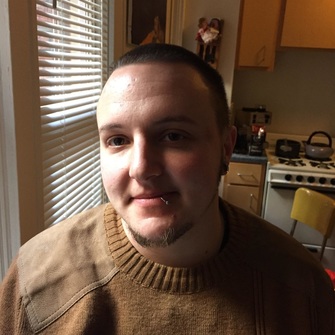 by Liam Kaplan I still can't eat defrosted peppers. They taste like sadness. I was 10 when my doctor first informed me that I was overweight. It was during a routine physical. I was weighed, palpated, prodded by a kindly old doctor with a thick, Israeli accent and olive-brown, calloused hands. He saw on my chart that I was one pound over the suggested BMI for 10-year-old, female-assigned children. He laughed and joked that I needed to go on a diet. My mother laughed too. My eyes widened as I sat there in my underpants, not comprehending my doctor's dry delivery. All I could think of were all the times my mother had gently informed me of my protruding gut. He could not have known how seriously I would take this attempt at humor over a non-issue. My belly had always been round. My younger sister was underweight at the time and received a lot of attention as a child model. We all fussed over her as she got head shots taken and went to modeling and acting auditions. My mother would observe that we could count her ribs when she was in the bathtub. I was never sure wehther this was a source for alarm or a quality to be aspired to. When she was measured for a dance costume, all three width measurements were the same. Again, the half chuckles of teachers and family over this fact seemed more awe than concern, to me. I learned that to be thin was to be loved. To have the sharpness of bones visible: the top of the pelvis, the deep hollow around the collarbones, the just barely sunken cheeks. I wanted that. I wanted not to fail at yet another test of girlhood. I am a 30-year-old man, who was raised female. I always knew I wasn't a girl, or a woman, or any of the qualities associated with those identities. Starving myself thin would serve not only as compensation for this failure to be a girl. It would curb the growth of hips and breasts that I so mortally feared. I asked my mother if I could start going to Weight Watchers with her. She agreed, excited to share this supposed zest for healthy living and bond with her "daughter." My father had just died suddenly and I clung to my mother with ferocity. I had to make her happy. I had to make her proud of her skinny, pretty girls. I started attending meetings. I was welcome there, even if I wasn't yet legally allowed to sign up. I watched enthusiastic ladies scrawl on large note pads about willpower and the evils of cravings. The evils of hunger. The allure of the great (and futile) pursuit of the lithe body that Twiggy made so famous. I was assured that I could eat as many vegetables as I wanted, as they cost no points from my weekly allotment. (Something that wasn't frequently in my mother's fridge, but that's a whole other story.) I mostly subsisted on the frozen meals and prepackaged snacks we purchased each week as part of the diet plan. It was all on the infamous points system. I almost never felt full. I was constantly dizzy and nauseous and learned to associate the flavor of defrosted peppers with sorrow. The waxy red and green peels, their pulp and acrid-tasting slime, choked down as punishment. Penance for my failure to reach the skeletal standard of beauty. I stayed the course righteously. I did indeed lose weight. And gained it all back when my mother ran out of money for the expense of being fat-shamed and sold empty calories. My disordered eating continued on and off through my adolescence. Fueled by the lessons of Weight Watchers and comments about being too fat to wear a midriff shirt. There were times when I would exercise furiously and live off of unsalted Matzoh and water. I weighed 100 pounds in middle school through almost all of high school. I was and still am the shortest, smallest member of my immediate family. It wasn't until I began to see fat-positive culture and come to terms with my gender that I became the rounder, happier man I am now. When I am reminded of old, fat-shaming messages, I turn to fat-positive literature. (FAT!SO?, by Marilyn Wann, was a game-changer for me.) I look to the bear community and remember that fat, hairy men are attractive and desirable. I steer clear of conversations with my family about how many pounds they've lost or gained. I hold my inner child and tell him he can take up space in this world. Liam Kaplan is 5 feet of spicy rage. He is a disabled artist and activist living in Seattle with his partner, Dorian, and his terrier, Cloud.
photo credit: By Justus Blümer from Deutschland (Paprika (rot)Uploaded by Common Good) [CC BY 2.0 (http://creativecommons.org/licenses/by/2.0)], via Wikimedia Commons. By Evan-Amos (Own work) [Public domain], via Wikimedia Commons. 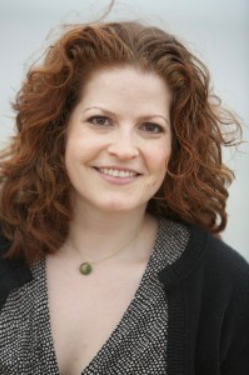 Schippert + Martin Photography Schippert + Martin Photography by Joanne Soolman, MS, RD, LDN I am a registered dietitian who specializes in working with individuals who struggle with eating disorders and disordered eating. My eyes were opened up to Health At Every Size® about two years ago, and it has had a huge impact on how I work with my patients as well as how I am working through my own body/weight/food issues. Ever since I was little, I was on the chubbier side. Not fat, exactly, but bigger than the other girls. As a result of this — and with the “OMGDEATHFAT” messages I received from my family (especially my mother), peers, and doctors — I began a life-long mission to become thin. My sister, who is nine years older than I am, is the only other person in our family who has had similar weight struggles. We both received the same message: fat = bad, unhealthy, undesirable; thin = good, healthy, and successful. Given that, we both spent much of our lives dieting, losing weight, and then regaining it. My sister continued to diet, lose weight, regain it, and repeat until about eight years ago when she “finally” lost the weight (about 50 pounds) and kept it off with Weight Watchers, a program that she had been on and off for a number of years. In addition, she decided to become a WW leader. That has been her career ever since. An actress by training, my sister thrives in an environment where she has a captive audience. Since she is keeping her weight lower, she is therefore the “expert” and the WW members in her groups look up to her. I took a different path. While I also dieted, lost weight, regained, and repeated, I decided to learn more about nutrition so that I could help myself and others. I went back to school, where I earned a master’s degree in nutrition and health promotion and completed the program to become a registered dietitian. Given my undergraduate degree in psychology, working with eating disorders seemed like a perfect fit for me. While I had never had a full-out ED myself, I definitely had engaged in disordered eating from time to time. As my sister and I have continued in our careers, our views on food, weight, and the body have begun to drastically differ. She continues to believe in and condone the idea that fat = bad and the idea that the only way for fat people to be healthy is to lose weight by following Weight Watchers. I have been practicing HAES and intuitive eating myself, as well as in my work with my patients. After years of the diet-lose-regain cycle, my weight has settled at a much higher point, while my sister continues to keep her weight lower by obsessing over points and living with the threat of losing her job if she gains weight. For the most part, my sister and I have agreed to disagree. We try to avoid talking about weight/body/food around each other, as it is a huge trigger. It’s difficult for me to be around her, as she is the exception to the weight-loss/regain rule, which makes me feel like a “failure,” since I am fat. She also gets a lot of respect and admiration from peers, friends, and family. They will often seek nutrition advice from her instead of me, despite my education and training in the field. My sister never went to school for nutrition and has no dietetic training, but since she is a weight loss “success” story, she is automatically the go-to girl for all questions nutrition. Conversely, even though I have more than thee years of nutrition schooling and training and have been a practicing dietitian for five years, the fact that I am fat automatically means I don’t know what I’m doing. Recently, my sister began appearing in two different television commercials for Weight Watchers, advertising their new consultant program. The ads consist of seven or eight different WW leaders talking straight into the camera. In one ad, the leaders talk about how the consumer can just pick up the phone and call a “coach” when facing a daunting food situation. In the other ad, the leaders talk about their own weight-loss journeys, some of them holding up their “before” pictures and saying how Weight Watchers changed their lives. The leaders talk about how they can help the consumer lose weight and keep it off, since they did it. My sister plays a prominent role in the second commercial. She says, “I was overweight for a really long time. And now I’m not! We understand, we’ve been there, we’re still going through it. I know you can do it, because I did it.” I love my sister. I know that in her heart of hearts, she is a good person and really believes that she is helping people, not harming them. While I am happy for her career success, I have felt very conflicted about the commercials, as Weight Watchers is in direct contrast to what I truly believe, how I perform my job, and how I live my life. I believe that people have the right to make their own choices and decisions about whether/how they take care of themselves — if you want to diet, that’s your prerogative. What I take issue with is Weight Watchers as a corporation exploiting individuals and telling us we are less-than if we are fat, or that there is something wrong with us if we choose to eat for reasons other than just hunger. It is a billion-dollar business built on making people feel badly about themselves, and I just can’t support that. Not only does Weight Watchers profit by making the consumer feel less-than, it fails to produce on its promises. As we all have heard many times before, diets fail 95 percent of the time, meaning only 5 percent of weight-loss attempts are sustainable. WW leaders fall into that elusive 5 percent. When the coaches in the new WW commercials say things like, “I know you can do it, because I did it,” it is completely misleading. These people are the exception to the rule, not the rule. Out of the millions of people who see these commercials and decide to do Weight Watchers, only a very small percentage of them will actually “succeed” by losing weight and keeping it off. How can Weight Watchers claim “It Works” when 95 percent of the time it doesn’t!? When you think about it from an economic perspective, the Weight Watchers business model is genius: 1) Convince the consumer that he/she is not good enough (e.g. lazy, fat, unhealthy, hopeless); 2) Sell the consumer the idea that Weight Watchers will solve all of their problems; 3) Reinforce the idea that when consumers inevitably go off Weight Watchers and regain the weight, they are to blame, not the diet; 4) Entice WW dropouts to come back for more. If Weight Watchers really truly “worked,” then they would be out of business fast! They keep on having repeat customers because the product is faulty, but Weight Watchers convinces the consumers they are “weak-willed,” and that is why the diet failed. And this results in major profits. While the commercials on their own are triggering and disturbing for me, the feelings are magnified by my sister’s involvement. It makes me very sad that my sister has not only joined the cult of Weight Watchers, but is actively spreading its damaging message. To keep the peace and not sever my relationship with her, I congratulated her on the ad and told her I love her. But in my home, I choose to immediately change the channel (or fast forward on DVR) whenever the commercial comes on. Joanne Soolman is a registered dietitian and co-owner of Soolman Nutrition and Wellness, LLC, located in Wellesley, Massachusetts. She and her husband Jonah, who is also a registered dietitian, provide outpatient nutrition counseling services for those in southeastern New England. Joanne got her BA in Psychology from Brown University and her MS in Nutrition and Health Promotion from Simmons College. Joanne specializes in nutrition counseling for individuals struggling with eating disorders and disordered eating. In addition to being a professional member of the Multiservice Eating Disorder Association, she is a proud member of the Association for Size Diversity and Health, promoting the principles of Health at Every Size®. 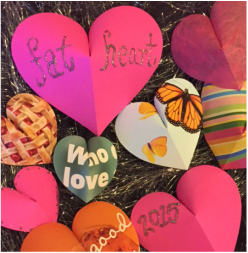 by Marilyn Wann You've heard the health warnings a few thousand times by now that claim being fat is bad for our hearts. Yet incessant repetition doesn't make it true. More than 50 years of undeniable autopsy data find no correlation at all between body weight and atherosclerosis (clogging of the arteries). Meanwhile, what if, as Deb Burgard, PhD, suggests, these dire warnings are themselves bad for us, via the nocebo effect, the evil twin of the placebo effect? What if the fear mongers are actually cursing us? All of which suggests it might be a good idea to <3 your heart on Valentine's day and year-round. You're not alone in facing social injustice. If class inequities, racism, and other oppressions contribute to heart disease, even more reason to share the love. Make your own public health message: Bless your big, fat heart! This project will take paper, scissors, glue, and about 5 minutes to complete… Step 1: Find some colorful paper. (Wrapping paper or pages torn from magazines work great.) Step 2: Fold the paper in half and cut out a heart shape. Step 3: Reverse the fold at the top of the heart and pinch. Step 4: Glue the reverse fold together. Pinch it until it dries enough to hold together. Optional step 4: Use tape instead of glue. Step 5: Decorate your big, fat heart. Add a message if you like. Hang it in an eye-catching spot. Step 6: Make a few more and give them to people you care about. Bless their big, fat hearts! Step 7: Send in your photos and I'll post them here… Big, fat thanks to Jessica Jones at How About Orange, where I came across the idea for this project.
|
storiesStories of rage and rebellion. Archives
June 2017
Categories |

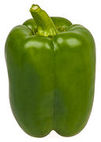
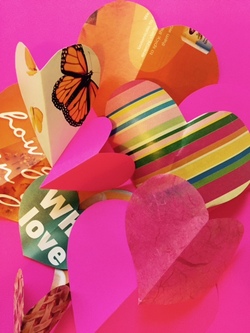
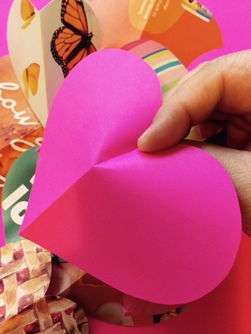

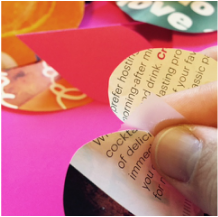
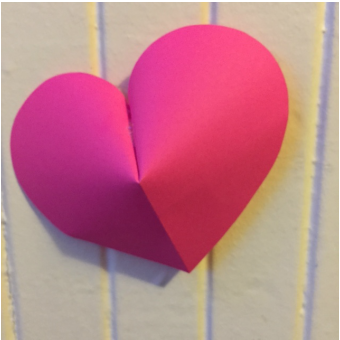
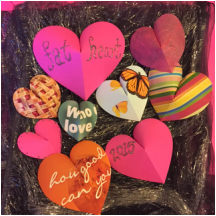
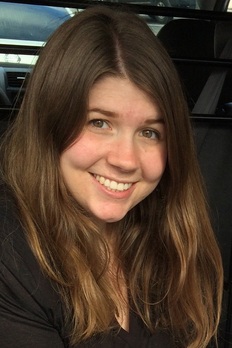
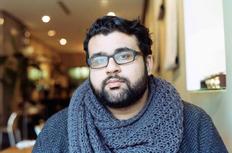
 RSS Feed
RSS Feed
